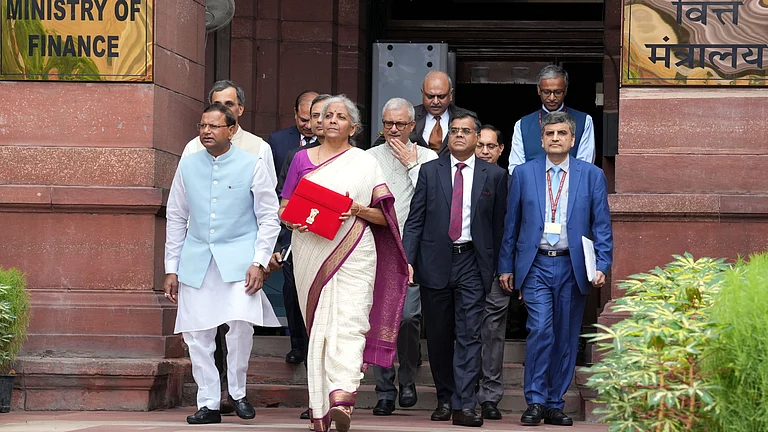
The new $100,000 H-1B visa fee is expected to encourage more companies to establish or expand GCCs in India.
India hosts over 1,760 multinational Global Capability Centers (GCCs), which generated $65 billion in FY24.
GCCs in India have more than doubled since 2010, now employing 1.9 million professionals.
India is home to over 1,760 multinational companies’ Global Capability Centers (GCCs) as of August 2025. Collectively, these centers generated revenue of $65 billion in fiscal year 2024. Experts believe the new $100,000 fee for companies seeking H-1B visas will push more firms to establish or expand capability centers in India.
These centers are used by MNCs to reduce the cost of back-office functions such as finance, human resources, accounting, compliance, sales support, service delivery, and software development. They have found a strong foothold in India over the past decades, thanks to the country’s large pool of IT and other skilled talent.
According to data from legal advisory firm Rodl & Partner, GCCs in India have more than doubled, from around 700 in 2010 to over 1,760 today, encompassing more than 3,050 GCC units. In fiscal year 2024, these centers employed 1.9 million professionals. Rodl & Partner’s report, released on August 1, forecasts that by FY30, India’s GCC landscape will generate $99–105 billion in annual revenue, with the number of companies exceeding 2,500.
Achyuta Ghosh, Executive Research Leader at HFS Research, describes the new H-1B visa fee as a “free pass to double down on the GCC model.”
“If access to Indian talent in the US becomes so expensive, the natural move for companies is to set up GCCs in India or expand their existing centers here,” he said.
According to a report by ANSR, over 67% of the Fortune Global 30 and 174 of the Fortune 500 have GCCs in India. These centers employ more than 950,000 professionals, with an increasing share of global functional leadership based in India.
Recently, several multinationals expanded their Indian operations. Aerospace major Rolls-Royce opened its newly expanded Global Capability and Innovation Centre in Bengaluru. In September, Carlsberg Group launched its first-ever IT GCC in Gurugram.
Goldman Sachs runs a GCC in Bengaluru, focusing on fintech innovation, advanced data analytics, and risk engineering. Walmart operates its Global Tech India centers in Bengaluru and Chennai, leading AI-powered retail innovations. Microsoft runs its India Development Center in Hyderabad, contributing to global tech initiatives, while JP Morgan Chase has a GCC in Hyderabad focusing on financial services technology.
Impact of the New H-1B Visa Fee
Starting September 21, companies hiring specialised workers under the H-1B visa will need to pay $100,000 in addition to other fees. These include a $215 cap registration (new rule), $780 I-129 base fee, $500 fraud fee, $750–$1,500 ACWIA training fee (based on company size), and a $600 Asylum Program Fee (with some reductions for small employers or nonprofits), plus optional premium processing.
The payment applies to H-1B approvals tied to beneficiaries outside the US and expires in 12 months unless extended after agencies report post-lottery. Some exemptions exist, such as for national-interest waivers, though it is not yet clear which companies may qualify.
Ghosh notes that the move could face challenges in court or Congress but sees it as a “gift to the GCC model.”
“Enterprises are likely to double down on their GCCs for critical functions because it provides control, cost efficiency, stable talent, and a secure talent pipeline without visa uncertainty. In the near term, we expect strong GCC demand from the US and Europe. Smaller players in India will scale up, while larger enterprises continue investing in existing centers,” Ghosh said.
“In the recent past, American organisations have been the largest users of H-1B visas. If they bear the brunt of these extra charges, many will still expand their GCCs. Companies with GCCs in India will likely grow them further, while those without may establish new ones,” he added, while noting that GCCs can also collaborate with third-party partners in India without visa-related hurdles.
Over the past five years, GCCs have increasingly taken on higher-value work, reflecting a broader transformation in operations.
“We have observed a significant rise in higher-value work coming out of India, which has boosted sector revenues. By higher-value work, we mean roles in engineering, architecture, digital, and product management—high-end positions increasingly handled from India. This shift toward innovative and strategic work is underway and expected to accelerate,” Ghosh explained.
More Uncertainties Ahead
For GCCs and Indian IT services providers, the H-1B visa is not the only factor in play. The recently proposed Halting International Relocation of Employment (HIRE) Act is also something to watch. The bill, introduced by Republican Senator Bernie Moreno earlier this month, has yet to be put to a vote in the US Congress, and experts believe it may face significant challenges to pass.
However, the proposal to impose a 25% tax on outsourcing payments has already sent a shiver through the Indian IT and GCC industry.
Achyuta Ghosh believes that if the bill passes, it will impact both IT services and the GCC model.
Roop Kaistha, Regional Managing Director – APAC, AMS, explains further. These models rely on a cost arbitrage of around 50–75%.
“There will still be positive, but thinner, arbitrage. Pre-tariff, the wage gap often remains equal to or less than 50% after accounting for inflation and currency moves. Post-tariff, processes such as engineering, application development, and R&D could retain savings, but with diminished buffers,” she told Outlook Business.
She added that mid-market GCCs could be disproportionately affected, as they lack the scale, balance sheet, and pricing power that larger enterprises use to absorb or reroute tariff costs. Many are also newer operations with thinner buffers and higher per-unit overheads.
IT Services Giants to Double Down on GCCs
Experts also believe the new rules will push Indian IT services providers to expand their GCC offerings.
Kamal Karanth, Co-founder of Xpheno, said IT services companies have been preparing for such developments.
“Over the last six months, many have appointed or hired new GCC heads to capitalise on the GCC route for business,” he noted, adding that MNCs will increasingly rely on GCCs and IT services firms in India, which remain cost-effective even after factoring in a 25% cess.
Infosys has carved out a dedicated GCC vertical and appointed Deval Shah to lead it. Wipro named Sandeep Dhar as global head of its GCC business. HCLTech appointed Kiran Cherukuri, a company veteran with 14 years of experience, to lead its global GCC practice, focusing on scaling offerings for captives and leveraging HCLTech’s partnerships with over 200 GCCs.
Mid-sized IT firms are also active. In July 2025, Mphasis invested $4 million for a 26% stake in Aokah, a US-based GCC advisory firm. Hexaware acquired SMC Squared, a specialist in establishing and managing GCCs.
“In the near term, IT services companies may become more aggressive in offering GCC-specific services, and the increased talent supply could also lead to softer pricing for GCC staffing,” Karanth said.



































